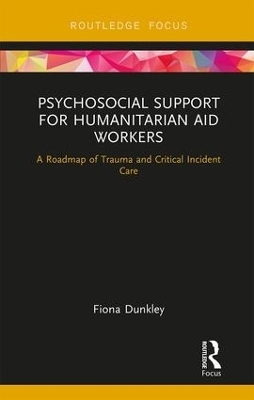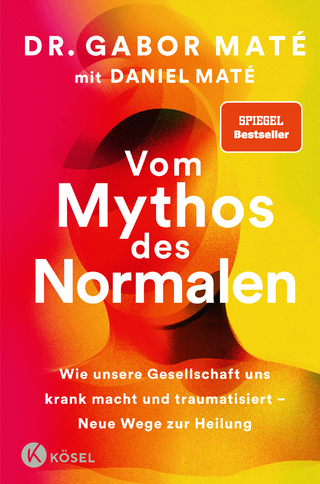
Psychosocial Support for Humanitarian Aid Workers
Routledge (Verlag)
978-1-138-70734-4 (ISBN)
From the humanitarian aid worker trying to organise support amongst chaos, to the professional offering a safe place for recovery, all of these individuals are at risk of becoming traumatised. Therefore, it is vital that we recognise the psychological risks on these individuals, and that they recognise how they can support themselves, so they can continue to function in the work that they do. This book can be used as a trauma awareness guide for all staff whose work exposes them – directly or indirectly – to trauma, and therefore becomes a risk to their physical or mental wellbeing.
Psychosocial Support for Humanitarian Aid Workers will appeal to all those working in the field of humanitarian aid, counsellors and psychotherapists, emergency first responders, as well as those who are looking to support themselves after surviving trauma.
Fiona Dunkley is a senior accredited MBACP Psychotherapist, Trauma Specialist, Supervisor and Trainer. She is a member of EMDR, UKRCP and ESTSS. Fiona founded FD Consultants, offering psychosocial support and trauma specialist services for humanitarian aid organisations. She has presented on ‘Good Morning Britain’ as a trauma expert, has published several articles and has been asked to speak at various international conferences.
Acknowledgements
Preface
1. Introduction: the roadmap of psychological risk
Aid work: the curse of the strong
Organisational duty of care
Ripple effect of trauma
The changing face of aid work
The scars of wisdom
2. The physiology of trauma:the mechanics of trauma
What is trauma?
The survival response
How is the brain impacted by trauma?
Common trauma symptoms
3. Treating trauma: support vehicles of recovery
What are trauma specialist treatments?
EMDR: how does it work?
Case study 1 (EMDR)
TF-CBT: how does it work?
Case study 2 (TF-CBT)
4. Resilience toolkit: the first aid kit
Relaxation
Education
Social
Physical
Exercise
Creativity
Thinking
5. Psychosocial management of critical incidents: the emergency route
Peter Moore: case study
Megan Nobert: case study
Organisational trauma
What psychological support should be available to staff after a critical incident?
Appropriate timings of offering psychological support
Summary of early interventions
6. The complete package of care: the road most travelled
Pre-deployment psychosocial support
Psychosocial support during deployment
Post-deployment psychosocial support
The homecoming
Conclusion
7. Cultural relevance of psychosocial support: local roadmaps
Culturally sensitive support
Cultural models of psychosocial support
Developing localised services or importing international professionals
Supporting national staff
Conclusion
8. Conclusion: the complete trauma grab bag
Survival
Unresolved trauma leads to war
Post-traumatic growth
Final thoughts
Sources of help
References
Index
| Erscheinungsdatum | 15.01.2018 |
|---|---|
| Reihe/Serie | Routledge Focus on Mental Health |
| Zusatzinfo | 1 Tables, black and white |
| Verlagsort | London |
| Sprache | englisch |
| Maße | 138 x 216 mm |
| Gewicht | 298 g |
| Themenwelt | Geisteswissenschaften ► Psychologie ► Persönlichkeitsstörungen |
| Medizin / Pharmazie ► Medizinische Fachgebiete ► Psychiatrie / Psychotherapie | |
| Sozialwissenschaften ► Pädagogik ► Sozialpädagogik | |
| Sozialwissenschaften ► Soziologie | |
| ISBN-10 | 1-138-70734-1 / 1138707341 |
| ISBN-13 | 978-1-138-70734-4 / 9781138707344 |
| Zustand | Neuware |
| Informationen gemäß Produktsicherheitsverordnung (GPSR) | |
| Haben Sie eine Frage zum Produkt? |
aus dem Bereich


